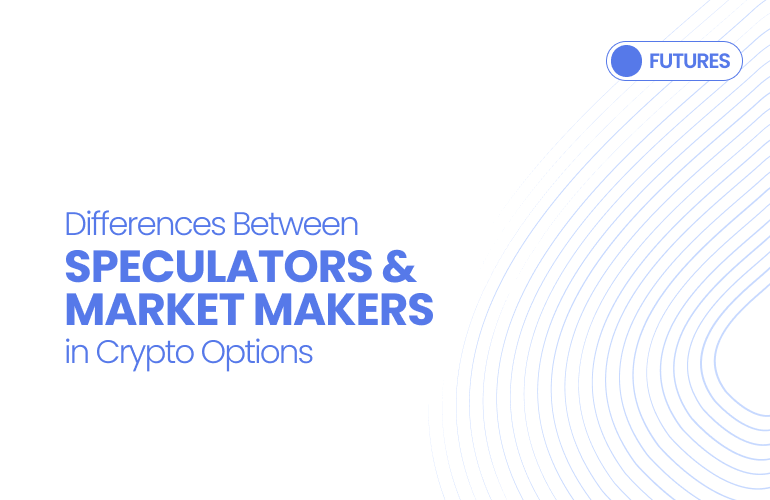There are two main types of investors in the options market: speculators and market makers. While both participate actively in buying and selling options, they do so with very different intentions, strategies, and profit motives. Speculators primarily aim to capitalize on market movements, whereas market makers in crypto focus on maintaining liquidity and stability within the market.
Who are Speculators?
Generally, investors who buy and sell a single option or create a trading strategy of multiple options in the market act as speculators. Option speculation helps them profit by successfully predicting movements in the price of an underlying asset over time, including an increase or decrease in the price of the underlying asset or the implied volatility (IV) of an option. Many traders also engage in option trading speculation to capture these short-term opportunities.
Who are Market Makers?
Market makers are typically large financial institutions that have contractually agreed to provide liquidity (that is, providing both bids and asks) to the market by continuously buying and selling options simultaneously.
Since options for an underlying asset generally have multiple expiration dates, each expiration date provides traders with multiple options for strike prices, and each strike price corresponds to a Call and a Put option. Therefore, market makers need to quote a large number of options at the same time, which also provides liquidity to the market. This kind of market operation often requires strong risk tolerance and the support of a large amount of funds, which is why market makers tend to be large financial institutions.
How Market Makers Earn Profits
Unlike speculators, market makers profit from the spread between the bids and asks of an option. The price difference between the mid-price and the bid-ask quotation can be regarded as a reward for market makers for providing liquidity services to the market.
Because of the differences described above, speculators and market maker strategies vary in their sensitivity to price movements. Speculators tend to seek greater profit between buying and selling on a single trade, while market makers are more focused on profiting from the bid-ask spread across many trades. This distinction highlights the difference between speculators and market maker in how they approach risk and reward.
Market Makers in Crypto Options Trading
Market makers in crypto operate on similar principles but in more volatile environments. Crypto markets often face lower liquidity and higher price swings, making the role of market makers even more critical for stabilizing order books.
Speculators in options markets often monitor market makers closely, trying to anticipate their pricing behavior and exploit short-term inefficiencies in option prices.
Option Pricing Dynamics
In the real-world investment market, investors don’t always play a single role. When setting quotations, market makers consider the underlying asset price, market volatility, their current positions, and overall market sentiment.
In bull and bear markets, market makers often hold positions opposite to current trends because they must place buy and sell orders simultaneously. For instance, during a bull run, market maker quotes can become skewed—raising ask prices for Call options while lowering bids for Put options.
The Interplay Between Speculators and Market Makers
As you can see, there’s a strong competitive and complementary relationship between speculators and market makers. Both are essential participants in shaping the price of options, with final prices ultimately determined by the dynamic interactions of all market participants.
More on Crypto Trading
Options Market-Making in Crypto: Risk Management and Edge Explained
Crypto Market Making: What is it & How it Works
What is Contract Trading in Crypto & How Does it Work?

